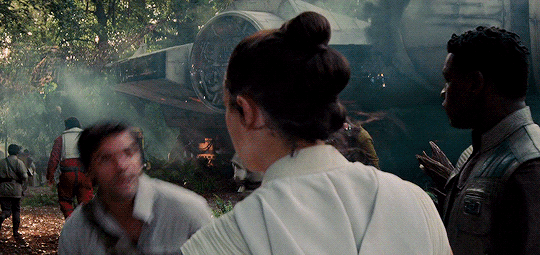#the amount of scooby gang shots they gave us...bless
Photo







#heroes of the resistance
#swedit#starwarsedit#starwarsblr#starwarsdaily#starwarsfilms#usercara#userfulcrum#userhaku#tuserhanna#beedameron#misterrimpossible#star wars#the rise of skywalker#jedistormpilot#poe dameron#finn#rey#nym.gifs#the amount of scooby gang shots they gave us...bless
1K notes
·
View notes
Text
Scooby Doo Idea
Okay. The Gang were friends in high school, and while they all (with one notable exception. Stay tuned.) went to different colleges, they stayed in touch. They had had sort of an amateur investigative service running back in school, so when they all got out of their respective post-high-school obligations and realized that they all had no immediate plans (and privately, each of them realized that they all had emotional damage that made them reluctant to just go do adult life), they decided to take their investigative skills on the road, mostly as an excuse to semi-drop-out of society. Hey, it’s 1970. These things happen. But then, wherever they go they keep bumping into things that really do need solving. (“But where did they get the money for the van?” Daphne. “But all the food they have to buy--” Daphne. “But most people probably don’t pay them once their mystery gets solved--” Daphne. Daphne hasn’t even come into her inheritance proper yet, but her trust fund alone could buy Switzerland for cash.) Again, we are not trying to make this take on the series “modern” or “interesting” by having the characters constantly be at each other’s throats. They genuinely care about each other (and because this is me, will have settled into a full-on polycule before the series is over). It’s just that they all have, from various sources, considerable emotional damage that they need to do their best to work through. (But we’re gonna do our best not to let them be defined by their damage. They still have [variants on] the personalities we know and love from the old cartoons.)
Norville “Shaggy” Rogers: As high school came to a close, he wasn’t really sure what he wanted to major in at college...and then Uncle Sam called, and he never got a chance to decide, because it was 1966 and the war was hungry. After three years of Hell, he got shot in the shoulder just badly enough to qualify for a discharge home, where he spent the next year failing to shake it off. Luckily for him, he’s blessed with a fairly supportive, understanding family, but still, he’s been through things no teenager should have to, and he’s been left with scars far deeper than the one in his left shoulder. (Note to self: get as accurate a picture as possible of actual PTSD symptoms. Yes, he has nightmares, and yes, there may be the occasional flashback, but we need more than just those two cliché things. Let’s see, what do I already know? Well, he gets protective of people he cares about, he’s generally kind of nervous and jumpy [as is the standard for this character, but now with more of a concrete reason], his huge appetite may partially be a reaction to memories of starving in the jungle; now that food is plentiful, he eats, because he can’t entirely convince his subconscious that it’s going to stay plentiful. And for all his cowardice, when things get bad, I mean really bad, he slips into a sort of...detached competence. A fugue-like, hyper-focused calm in which he knows exactly what to do, and will put all his energy into seeing it done.) However, as I said, none of these people are entirely defined by their damage. When he’s calm, or at least comparatively calm (which sometimes comes with the help of pot) there shines through a caring, empathetic, gentle man with a surprisingly deep wisdom and a laid-back sense of humor. Also, in addition to his voracious appetite, he’s an excellent cook, and putting his energy into cooking is one of the things that can help calm him down after his symptoms get bad, and generally be a thing in his life that helps him heal. In addition to this, during his Year Of Failed Recovery, his uncle, who had a similarly hard time recovering after World War Two, suggested that he get a dog, advice which Shaggy took, which brings us to…
Scoobert “Scooby” Doo: What you need to understand about Scooby in this version is...he’s a dog. He’s very intelligent...for a dog. He’s very helpful in dangerous situations...for a dog. He’s surprisingly good at communicating with humans...for a dog. But he doesn’t talk, and he is not supernatural in any other way. He’s a dog. Nevertheless, he serves an important role in the group, not least of which is as Shaggy’s (though he’s never officially called this, as I believe the phenomenon was not a recognized as a medical phenomenon in 1970) emotional support dog. Like most dogs, he’s good at sensing what mood his people are in, and Shaggy is his people (and so are the others, eventually), so even though the actual training that emotional support animals get today didn’t exist for him to get, he can tell when Shaggy is in a particularly upset mood, and offer comfort. In addition, having an animal to care for gave Shaggy one more means of grounding. Plus, it doesn’t matter how well-planned your criminal scheme is, or how dedicated you are to it, if a big fuckoff Great Dane comes charging at you full-tilt, you’re gonna move. Most of his usual cowardice is probably gone in this version; in fact, if he feels that his people are in danger, he will not hesitate to square up and fight.
Frederick “Fred” “Freddie” Herman Jones: His father wanted a strong son; an athlete; the golden All-American boy...and he got it, by Hell or high water. Genuine interest in his son as a person? Willingness to support unconventional hobbies? Any affection given without Fred “earning” it by living up to one of the many standards of “manliness”? Naaaaaaaahhhh. Which was a problem, because Fred showed early on that he had little natural inclination towards what his father wanted him to be. His interests lay in painting, a particular breed of fashion, and mechanical things (and not the car kind.) Well, Papa Jones didn’t want any egghead or sissy for a son, and his efforts to “correct the problem” were, by most estimations, excessive. The man had a fast and furious temper. (And Mom died when Fred was very young, far too soon to do anything to counteract Dad’s influence) So Tiny Freddie learned to lie and suppress and play his part, and he played it so well that it couldn’t help become genuinely part of who he was (and, because children are children no matter what their parents are like, the praise he got when he finally lived up to his father’s standards warmed his little heart in a way he couldn’t control, even as he hated how much he had to hide), but through it all, he kept up his true self in secret, as much as he could, scheming and planning and hoping for the day when he could leave home and leave his father’s ideals behind. And he got into college (he got his father to accept an engineering major with only minimal cold disdain by pointing out all the possible connections to construction) and started trying to shed all of his father’s influence...only to find that he couldn’t, entirely. If you ask him point-blank, he will say that he knows his father was wrong and he’s not ashamed of his true self or his true interests, but getting out from under a lifetime of abuse is never that easy. After 18 years of being glared at and derided and shouted at and hit every time he did something “Poindextery” or “girly” or “weak”, the inner voice that does the same is something he has to face down and banish almost constantly. And as I said, some of the All-American Boy affect has just become part of who he is. His healthiest self, when he can find it, is the best of both worlds, with the gregarity and leadership skills of the Golden Boy combined with true embrace of the artist and inventor he is.
Velma Dace Dinkley: Her home life during childhood was just fine. The trouble came when those pesky peers showed up. She was short, and serious, and academic, and plain, and wore big thick glasses, and so she did not get along easily with the other children. She took things seriously, so when they teased, she took that very seriously, and lashed out, which only ostracized her more. Eventually, she buried the rage the only way she could: under layer upon layer of academia, forced apathy, and prickly snark. But underneath that, she was lonely. She didn’t feel lovable, or wanted, and she was frustrated by her inability to fix whatever it was that was wrong with her. Not that she was willing to admit any of this to herself, except in the dark and still of her bedroom at midnight. Who knows just how isolated she might have become if she hadn’t fallen in with the Gang during high school. As it is, she’s cynical, has a hard time dealing with or admitting to her own emotions, and is extremely distrustful of overt kindness or friendliness (the Gang get a pass on this because she knows them well, but if a stranger starts being noticeably nice to her, out come the quills.) She is, however, scary-smart. Smart enough to get PhDs in English and History in the time it took Fred and Daphne to get their Bachelors. And sometimes, when she’s around friends and feels safe, that clever, biting wit can be used for good, instead of to push people away “before they have a chance to hurt her”.
Daphne Anne Blake: What you have to understand is that the Blake family is rich. Wildly rich. Unimaginably rich. No, richer than you’re picturing. No, double that amount. No, on second thought, square it. The other thing you have to understand is that they have been this rich for slightly longer than America has existed as a political entity. So growing up a Blake certainly comes with privileges that most children can only dream of, but it also has its drawbacks, chief among which is that you will never, for one second, be allowed to forget that you are A Blake. And such was Daphne’s childhood. Grace, deportment, beauty, all the skills of a lady, perfection. Never a hair out of place, never a stain on that dress, never a sour note, never an uncouth word or gesture, don’t frown, dear, it wrinkles your forehead, but don’t laugh to hard, it puts lines around your mouth, and don’t you dare fall off that horse. After high school, she went on to Harvard for a B.A. in Psychology, because it’s important for even girls to be properly educated. And it’s all left her a scant hop skip and a jump away from being a nervous wreck. She needs everyone to like her all the time, she needs to look perfect, she needs to be perfect. But at least on some level, she doesn’t want to need to be perfect. She wanted to be able to relax, wanted to let her hair down, wanted to find an identity outside of being A Blake. Lucky for her, she’s the youngest of a large co-ed brood, and her parents suddenly decided that it was chic to have a child who was being slightly rebellious. So as long as she doesn’t get her name in the papers in a negative way, or overspend her allocated trust fund (which would be an impressive feat), they’re perfectly happy to titter at parties about how their youngest daughter is off roaming the country with her strange little friends. As to her quest to find herself outside of her family, it has and hasn’t succeeded. She’s mostly managed to reject generational snobbery and extend her gracious manners to one and all, but sometimes without thinking about it (or sometimes on purpose when they need it for a case) she slips into The Manner Born. And it’s been a long hard process puzzling out how much of the infinite lessons she can keep and use for good, and which she must discard. (For example, she’s certainly in no hurry to abandon her taste for the finer things in life, and if you’re going to make a life out of chasing down criminals, there are worse things than being a trained fencer.) No matter what she does, she’s always going to be a lady. She just hopes to become a true gentlewoman, rather than the paradoxical people-pleasing snob her parents were raising. Her biggest progress has come in the form of letting go of any residual feelings of superiority, and becoming less and less afraid to have and state her own thoughts and opinions, no matter who does and doesn’t agree with them. She’s working on that. Slowly.
Relationships
So, like I said, the endgame here is a full-on, everybody x everybody else poly situation. But even though they (eventually) think of themselves as a foursome, with no one pairing getting any precedence but rather the four of them being a group, it is true that within that group, there are six pairs, and each individual pair is strong enough that (if I may be morbid) if any two of them died, the remaining two would stay together. So here is a summary of each of the pairs.
Fred/Daphne: Ah, the classic pair. It’s a cliché, perhaps, but they really do have plenty to bond over.They both struggle with the weight of parental expectations, they both have a flair for personal style, and heaven knows they look good together. They spend a lot of time talking to each other and helping each other with the problems that come from their parents’ respective demands, but they also have a lot of fun enjoying together the more “preppy” things that Shaggy and Velma don’t like so much.
Shaggy/Velma: The other cliché, mostly a result of pairing the spares. However, it has its legitimate reasons to exist as well. Their senses of humor complement each other; Shaggy’s more overt clowning works well with Velma’s snark. As the two more “alternative” members of the gang, they also make sense as a couple in public. Shaggy’s earnestness, empathy and sillieness can help get past Velma’s shell, and her no-nonsense practicality can often help to calm his nerves.
Daphne/Velma: The third most popular pairing (or possibly even the second, however much I might want to kid myself about the ubiquity of my childhood OTP). On some level, Velma may be put off by (and might also envy) Daphne’s beauty and grace, but she can’t help but also be drawn to it, and be constantly delighted to find the intelligence underneath. Daphne, for her part, loves Velma for her intelligence, and is amazed by her forthrightness and assertiveness. In addition, Daphne has decided that Velma’s low estimation of her own desirability is unacceptable, and has taken it upon herself to shower her with all the attention she should have been getting all these years. She’s been put on enough pedestals of her own to know how to construct one for someone else, and has thrown herself wholeheartedly into singing “Dulcinea” under Velma’s metaphorical window. Velma’s reaction to this is...complex (which is to say, she would like to just let herself enjoy it, but can’t entirely shut off her reflexive cynicism).
Fred/Shaggy: They don’t always talk very much, but that’s okay. They enjoy the quiet. Shaggy appreciates having a leader-type around, and Fred takes comfort in Shaggy’s utterly accepting nature.
Fred/Velma: In some ways, they can get competitive, but it’s never vitriolic. It’s just that she’s never been one to hide her light under a bushel, and Fred’s reaction to how impressed he is with her is to want to impress her by trying to match up to her, and she respects him enough to not talk down to him or slow up so he can catch up, and so it spirals. She shows more and more skill at investigating and figuring out who the culprit is; he refines his plans and traps more and more. That’s why it so often seems ambiguous whether Fred or Velma is the leader; they’re sparring over the title.
Daphne/Shaggy: Well, he can’t help but be a little awed that such an obvious princess is into a guy like him. And he’s so unlike the boys shes used to that she can’t get enough of him. Their differences only make them stronger. And with her Psychology degree, she may be the one most equipped to actually help him with his symptoms. No, she’s not a therapist, but at least she knows the technical terms for what’s happening, and may have a list of possible treatments. And she revels in how few expectations he has.
@scoobydooservicedog You’re getting tagged because part of this relates to what you do (and because you seem cool and I kinda want to know what you think)
#scooby doo#shaggy rogers#norville rogers#fred jones#daphne blake#velma dinkley#poly mystery inc#fraphne#shelma#velma x daphne#fred x shaggy#fred x velma#daphne x shaggy
2K notes
·
View notes